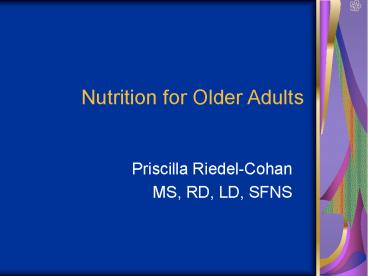Nutrition for Older Adults - PowerPoint PPT Presentation
Title: Nutrition for Older Adults
1
Nutrition for Older Adults
- Priscilla Riedel-Cohan
- MS, RD, LD, SFNS
2
Lesson Objectives
- Compare the calorie and nutrient needs of the
individual in the later years of the life cycle
to that of earlier years. - Discuss disease conditions and obstacles to
adequacy that may be experienced by the older
adult.
3
Calories and Activity
- Energy needs decrease as people age.
- This is due to
- Decreased activity level
- Decreased metabolic rate
- Decreased muscle tone
4
- It is important to ensure that older adults do
not suffer from the dwindles. This is
described as - Decreased physical ability to function
- Diminished mental function
- Malnutrition
- Social withdrawal
- Weight loss
5
Protein and the Older Adult
- Protein needs remain the same in older adulthood
as they did when the adult was younger. - The RDA for protein is 0.8 grams per kilogram
(kg) of body weight. - Alternate protein sources may be necessary
because traditional protein foods may be hard to
chew. - Soft protein foods may be best.
6
Carbohydrate, Fiber, and the Older Adult
- Carbohydrates remain important for nourishing the
brain. - Fiber is necessary to help alleviate the
constipation that some older adults experience in
later life. - High fiber foods may include fresh fruits and
vegetables as well as high fiber grain products. - It is important to make sure foods can be chewed
and swallowed, so fiber is often offered in the
form of over-the-counter products like Metamucil.
7
Fat, Arthritis, and the Older Adult
- Good sources of essential fatty acids in the diet
continue to be important. - Food sources of omega-3 and omega-6 fatty acids
include nuts, legumes, and coldwater fish like
salmon.
8
- Saturated fat and trans fatty acids may
contribute to heart disease. - A low fat diet may help alleviate the symptoms of
rheumatoid arthritis, but it does not address the
symptoms of osteoarthritis. - Osteoarthritis may be addressed with weight loss.
9
Vitamins and the Older Adult
- Vitamin A absorption generally improves in later
life. - Vitamin D synthesis declines and may contribute
to osteoporosis. This is particularly important
to address with the elderly who are confined to
the indoors. - Vitamin B12 deficiency is likely with the
decrease in production of intrinsic factor
necessary for its absorption or when meats are
diminished in the diet due to chewing or
swallowing difficulties.
10
Water, Minerals, and the Older Adult
- Dehydration is a major concern for the older
adult. - It is believed that some dementia or loss of
mental function in the elderly may be due to
chronic dehydration. - The sense of thirst is diminished in the elderly.
- They are more at risk as a result to become
dehydrated. - The elderly must make a conscious effort to drink
fluids often.
11
- A high fiber diet requires the older adult to
also consume more water.
12
- Iron status generally improves later in life.
- Zinc deficiency is somewhat common in the elderly
primarily because of drug/nutrient interactions.
This blunts the sense of taste. - Calcium absorption declines with age.
Osteoporosis is common in this population. - Lactose-free milk can offer an alternative for
those individuals who complain of discomfort from
drinking milk.
13
- A low-dose vitamin/mineral supplement may be
helpful to all older adults to ensure nutrient
needs are met.
14
Nutrition and Longevity
- There are 6 factors that have been found to
influence the physiological age of an individual. - Of those, 3 are nutrition-related
- Moderation of alcohol use
- Regular, nutritious meals
- Weight control
15
Nutrition and Alzheimers Disease
- There are weak links between the onset of
Alzheimers disease and nutrition. - Research is on-going.
- Regular meals and wise food choices continue to
be at the forefront of good health for people
with Alzheimers disease.
16
Food Choices of Older Adults
- Many factors may influence the food choices of
the older adult. - In particular, older adults experience obstacles
to an adequate dietary intake. - Tooth loss
- Inability to chew or swallow
- Marital or social status
- Disposable income
- Multiple medications
17
- Social services programs available to the elderly
include - Social Security
- Medicare
- Food Stamps
- Meals on Wheels
- Child and Adult Care Food Program
18
In Summary
- The older adult experiences many changes in their
nutritional needs at this stage of the life
cycle. - Their nutritional status may be compromised by
disease or other obstacles to adequacy. - Caregivers play a major role in maintaining the
nutritional health of the older adult.









![[READ]✔️ Williams' Essentials of Nutrition and Diet Therapy (Williams' PowerPoint PPT Presentation](https://s3.amazonaws.com/images.powershow.com/10076454.th0.jpg?_=20240710116)





















